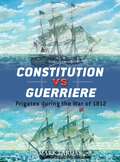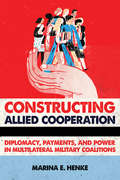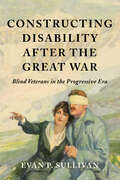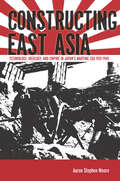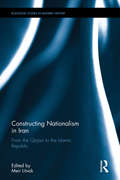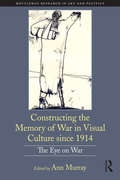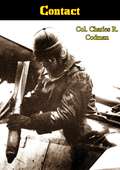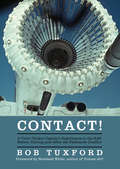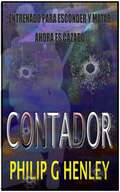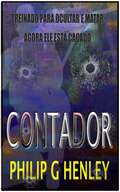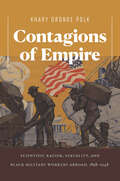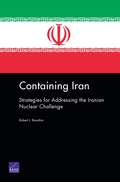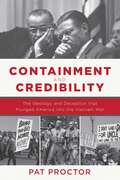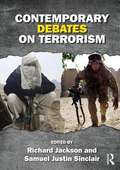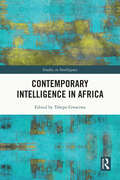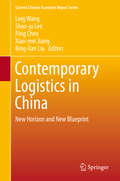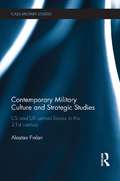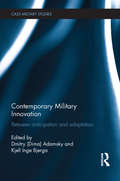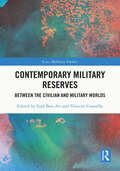- Table View
- List View
Constantly Cotton (The Flophouse #2)
by Amy LaneWhen Jason Constance rescued a busload of kidnapped children, he didn&’t expect a parade. He didn&’t expect to be hunted by mobsters and the military either. Wounded and half out of his mind, Jason finds himself at the tender mercies of an angel-faced nurse named Cotton.Cotton has just flunked out of porn, and as far as he can tell, he&’s flunking life too. Having an injured colonel in his bed seems par for the course, but he&’s too busy keeping Jason alive to question how fate brought him there.But fate isn&’t done with them. When they go on the run from the mobsters who shot Jason, there should be no time to fall in love, but neither man seems suited for an average life—or relationship. Jason and Cotton can probably survive homicidal mobsters and rogue military operations. The question is, can they survive the work they&’ll have to do to forge a place just for them?
Constitution vs Guerriere
by Peter Bull Mark LardasFamed as a classic naval duel, the clash between two sailing frigates of the nineteenth century affords its victor immeasurable fame and glory. During the War of 1812, the Royal Navy and United States Navy squared off in a number of such duels, the most famous between the USS Constitution and HMS Guerrière. Tactics between the two nations varied enormously, with the American Navy favoring twenty-four pound guns, heavy carronades, and larger crews, while the British tended to equip its frigates with eighteen-pound guns and smaller, more economical crews. Through first-hand accounts of officers and sailors present at the battles and fascinating comparisons of artillery, crew ability and tactical achievements, this book offers an unparalleled insight into the ruthless reality of frigate battles in the War of 1812.From the Trade Paperback edition.
Constrained Balancing: The EU’s Security Policy
by Dirk PetersThe creation of the EU's autonomous security policy in 1999 ended ten years of political conflict. In this book, the policies of Britain and Germany are analyzed as those of 'constrained balancing': balancing US post-Cold War supremacy with the constraints of established security institutions.
Constructing Allied Cooperation: Diplomacy, Payments, and Power in Multilateral Military Coalitions
by Marina E. HenkeHow do states overcome problems of collective action in the face of human atrocities, terrorism and the threat of weapons of mass destruction? How does international burden-sharing in this context look like: between the rich and the poor; the big and the small? These are the questions Marina E. Henke addresses in her new book Constructing Allied Cooperation. Through qualitative and quantitative analysis of 80 multilateral military coalitions, Henke demonstrates that coalitions do not emerge naturally. Rather, pivotal states deliberately build them. They develop operational plans and bargain suitable third parties into the coalition, purposefully using their bilateral and multilateral diplomatic connections—what Henke terms diplomatic embeddedness—as a resource. As Constructing Allied Cooperation shows, these ties constitute an invaluable state capability to engage others in collective action: they are tools to construct cooperation.Pulling apart the strategy behind multilateral military coalition-building, Henke looks at the ramifications and side effects as well. As she notes, via these ties, pivotal states have access to private information on the deployment preferences of potential coalition participants. Moreover, they facilitate issue-linkages and side-payments and allow states to overcome problems of credible commitments. Finally, pivotal states can use common institutional contacts (IO officials) as cooperation brokers, and they can convert common institutional venues into fora for negotiating coalitions.The theory and evidence presented by Henke force us to revisit the conventional wisdom on how cooperation in multilateral military operations comes about. The author generates new insights with respect to who is most likely to join a given multilateral intervention, what factors influence the strength and capacity of individual coalitions, and what diplomacy and diplomatic ties are good for. Moreover, as the Trump administration promotes an "America First" policy and withdraws from international agreements and the United Kingdom completes Brexit, Constructing Allied Cooperation is an important reminder that international security cannot be delinked from more mundane forms of cooperation; multilateral military coalitions thrive or fail depending on the breadth and depth of existing social and diplomatic networks.
Constructing Disability after the Great War: Blind Veterans in the Progressive Era (Disability Histories)
by Evan P. SullivanAs Americans--both civilians and veterans--worked to determine the meanings of identity for blind veterans of World War I, they bound cultural constructs of blindness to all the emotions and contingencies of mobilizing and fighting the war, and healing from its traumas. Sighted Americans’ wartime rehabilitation culture centered blind soldiers and veterans in a mix of inspirational stories. Veterans worked to become productive members of society even as ableism confined their unique life experiences to a collection of cultural tropes that suggested they were either downcast wrecks of their former selves or were morally superior and relatively flawless as they overcame their disabilities and triumphantly journeyed toward successful citizenship. Sullivan investigates the rich lives of blind soldiers and veterans and their families to reveal how they confronted barriers, gained an education, earned a living, and managed their self-image while continually exposed to the public’s scrutiny of their success and failures.
Constructing East Asia: Technology, Ideology, and Empire in Japan's Wartime Era, 1931-1945
by Aaron Stephen MooreThe conventional understanding of Japanese wartime ideology has for years been summed up by just a few words: anti-modern, spiritualist, and irrational. Yet such a cut and dried picture is not at all reflective of the principles that guided national policy from 1931–1945. Challenging the status quo, Constructing East Asia examines how Japanese intellectuals, bureaucrats, and engineers used technology as a system of power and mobilization—what historian Aaron Moore terms a "technological imaginary"—to rally people in Japan and its expanding empire. By analyzing how these different actors defined technology in public discourse, national policies, and large-scale infrastructure projects, Moore reveals wartime elites as far more calculated in thought and action than previous scholarship allows. Moreover, Moore positions the wartime origins of technology deployment as an essential part of the country's national policy and identity, upending another predominant narrative—namely, that technology did not play a modernizing role in Japan until the "economic miracle" of the postwar years.
Constructing Nationalism in Iran: From the Qajars to the Islamic Republic (Routledge Studies in Modern History)
by Meir LitvakNationalism has played an important role in the cultural and intellectual discourse of modernity that emerged in Iran from the late nineteenth century to the present, promoting new formulations of collective identity and advocating a new and more active role for the broad strata of the public in politics. The essays in this volume seek to shed light on the construction of nationalism in Iran in its many manifestations; cultural, social, political and ideological, by exploring on-going debates on this important and progressive topic.
Constructing the Memory of War in Visual Culture since 1914: The Eye on War (Routledge Research in Art and Politics)
by Ann MurrayThis collection provides a transnational, interdisciplinary perspective on artistic responses to war from 1914 to the present, analysing a broad selection of the rich, complex body of work which has emerged in response to conflicts since the Great War. Many of the creators examined here embody the human experience of war: first-hand witnesses who developed a unique visual language in direct response to their role as victim, soldier, refugee, resister, prisoner and embedded or official artist. Contributors address specific issues relating to propaganda, wartime femininity and masculinity, women as war artists, trauma, the role of art in soldiery, memory, art as resistance, identity and the memorialisation of war.
Contact
by Col. Charles R. CodmanOriginally published in 1937, this book is the story of one New Englander's experience in the bombing service during the First World War. He tells of his training and his experiences in France, as well as his friends and of his imprisonment in Germany.Simple and direct in style, this book will appeal to those who served in the air overseas, and those whose background is factual and not theoretical.
Contact!: A Victor Tanker Captain's Experiences in the RAF, Before, During and After the Falklands Conflict
by Bob TuxfordA retired RAF Squadron Leader recounts his decades of service in Cold War combat zones across the globe, including his crucial role in the Falklands. Joining the Royal Air Force in 1970, Bob Tuxford distinguished himself as a fighter pilot, test pilot, squadron leader and flying instructor. In this enthralling memoir, he shares his story of active service across the world. Among other episodes, Tuxford details his exchange tour in the US Air Force and his courageous mission during the Falklands war that earned him an Air Force Cross for Gallantry. As a Victor tanker captain, Tuxford had the job of executing air-to-air refueling operations through the 1970s and early 1980s. This experience prepared him for the vital role he played in the first Black Buck mission during the Falklands campaign. Tuxford was the last Victor tanker to refuel the Vulcan piloted by Martin Withers before bombing commenced on that fateful night in 1982. Later in his career, Bob became the senior test pilot on the heavy aircraft test squadron at the Aircraft and Armament Experimental Establishment, Boscombe Down. In Contact!, Tuxford offers an intimate look at life in the RAF while shedding light on the importance of tanker squadrons during the Cold War.
Contacto en la Cruz de Fuego (Crónicas de Contacto #2)
by Louis Edward RosasEn un desafío directo a la República Popular China, la Armada de los Estados Unidos ha sido enviada al Mar de China Meridional. Ellos, junto con sus aliados japoneses, están allí para realizar Operaciones de Libre de Navegación en Aguas Internacionales cerca de la disputada cadena de las Islas Spratly. Pero a medida que aumentan las tensiones, ha ocurrido algo extraordinario. Acechando en lo alto de las nubes a 20.000 pies sobre el nivel del mar, un objeto escurridizo de origen o intención desconocidos se ha inmiscuido en el espacio aéreo en disputa dejando poco margen de error. A medida que el equilibrio geopolítico de poder se acerca cada vez más al conflicto armado, dependerá de la Teniente Comandante Eileen Hunter, aviadora naval estadounidense, presionar al hombre y a la máquina para evitar una guerra y descubrir una verdad prohibida. Continuando con la intriga de Planeta Robot, el autor estadounidense Mishima Louis Edward Rosas presenta una nueva aventura de vuelos por lo alto que profundiza en las tensiones geopolíticas actuales que tienen lugar en el Lejano Oriente. El Contacto en la Cruz de Fuego no solo cuestionará más si estamos solos en el universo, sino que, de ser así, hasta qué punto han influido en nuestros asuntos.
Contador
by Philip G Henley¨The Counter¨, es un libro maravilloso que cuenta los avatares de Hellen, un agente en misión en búsqueda "El Contador", su enemigo. Tras su búsqueda se enfrenta a una serie de controversias y realidades que confrontan su vida, al punto de exponerse al más inminente peligro. El autor de manera muy sutil lleva de la mano al lector a atravesar cada vivencia de Hellen.
Contador
by Philip G HenleyContador de Philip G Henley As balas são reais Contador Ben Walker, The Count, está fora da grade se escondendo por causa do que ele pegou. Uma vida nas sombras com operações militares secretas foi encerrada. Ele procurou vingança. Ele localizou a cadeia de comando. LC é o homem que tentou matá-lo, mas ele fez uma oferta para ser um tipo diferente de caçador. Agora, Walker pegou informações e dinheiro e se escondeu. LC quer Walker e o que ele levou. Ele tomará medidas extremas para obtê-lo. LC também desapareceu. Ele também é procurado. Os caçadores agora são caçados. Helen Lawrence faz parte de uma equipe remendada do labirinto de agências governamentais. Eles tentaram encontrar Walker para que ele pudesse ajudar a encontrar LC, que também desapareceu. Os membros da equipe não são tudo o que parecem e, se o encontrarem, a verdadeira caça precisa começar. Ela tem seus próprios problemas e desejos sem se envolver com Walker. Os dados ausentes são valiosos. Os motivos das agências são desconhecidos. As balas são reais.
Contagions of Empire: Scientific Racism, Sexuality, and Black Military Workers Abroad, 1898–1948
by Khary Oronde PolkFrom 1898 onward, the expansion of American militarism and empire abroad increasingly relied on black labor, even as policy remained inflected both by scientific racism and by fears of contagion. Black men and women were mobilized for service in the Spanish-Cuban-American War under the War Department's belief that southern blacks carried an immunity against tropical diseases. Later, in World Wars I and II, black troops were stigmatized as members of a contagious "venereal race" and were subjected to experimental medical treatments meant to curtail their sexual desires. By turns feared as contagious and at other times valued for their immunity, black men and women played an important part in the U.S. military's conscription of racial, gender, and sexual difference, even as they exercised their embattled agency at home and abroad.By following the scientific, medical, an cultural history of African American enlistment through the archive of American militarism, this book traces the black subjects and agents of empire as they came into contact with a world globalized by warfare.
Containing Iran: Strategies for Addressing the Iranian Nuclear Challenge
by Robert J. ReardonIran's nuclear program is one of this century's principal foreign policy challenges. Despite U. S. , Israeli, and allied efforts, Iran has an extensive enrichment program and likely has the technical capacity to produce at least one nuclear bomb if it so chose. This study assesses U. S. policy options, identifies a way forward, and considers how the United States might best mitigate the negative international effects of a nuclear-armed Iran.
Containment and Credibility: The Ideology and Deception that Plunged America into the Vietnam War
by Pat ProctorIs it possible that a president and his administration would purposefully mislead the American public so that they could commit the United States to a war that is not theirs to fight? Anyone with even a remote memory of the phrase "weapons of mass destruction” probably finds such a question naive. On the eve of the fiftieth anniversary of the Vietnam War, those with longer memories would consider the unquestioning acceptance of Saddam Hussein’s "gathering threat” even more naive. Providing historical context that highlights how the decision to use force is made, as well as how it is "sold,” Containment and Credibility explores how the half-truths and outright lies of both the Johnson and Nixon administrations brought us into a conflict that cost more than fifty thousand American lives over eight years. As we consider how best to confront the growing threat of ISIS, it is increasingly important for the public to understand how we were convinced to go to war in the past. In the 1960s, the domino theory warning of the spread of communism provided the rationale for war, followed by the deception of the Gulf of Tonkin Incident and the resulting resolution that essentially gave LBJ a blank check. This book will show how this deception ultimately led to the unraveling of the Johnson presidency and will explore the credibility gap that led to the public political debate of that time. Containment and Credibility applies the lessons of the sixties to today’s similar debates regarding military involvement. Skyhorse Publishing, as well as our Arcade imprint, are proud to publish a broad range of books for readers interested in history--books about World War II, the Third Reich, Hitler and his henchmen, the JFK assassination, conspiracies, the American Civil War, the American Revolution, gladiators, Vikings, ancient Rome, medieval times, the old West, and much more. While not every title we publish becomes a New York Times bestseller or a national bestseller, we are committed to books on subjects that are sometimes overlooked and to authors whose work might not otherwise find a home.
Contamination (Star Trek: The Next Generation #16)
by John VornholtThe U.S.S. Enterprise . is stunned when famed scientist Lynn Costa is murdered in one of the ship's science labs. She and her husband Emil were known as science's greatest ongoing collaboration and, together had received the Federation's highest honors for their achievements in scientific research. Determined to see the culprit brought to justice, Captain Picard assigns Lt. Worf and Counselor Deanna Troi to the case. their routine investigation of the ship's science lab soon reveals a dangerous web of deceit, betrayal, and madness. Now, Worf and Troi find themselves struggling against a ruthless assassin set on revenge -- for whom murder is only the beginning...
Contatto a Fiery Cross: Qualcun altro si è unito al gioco (Cronache del contatto #2)
by Louis Edward RosasSfidando apertamente la Repubblica Popolare Cinese, alcune unità della Marina degli Stati Uniti sono state inviate nel Mar Cinese Meridionale. Assieme ai loro alleati giapponesi, devono condurre un'Operazione per la Libertà di Navigazione nelle Acque Internazionali, vicino all'arcipelago delle Isole Spratly oggetto della contestazione. Mentre aumentano le tensioni, però, accade qualcosa di straordinario. Nascosto fra le nuvole, a 20.000 piedi sul livello del mare, uno sfuggente oggetto di origine e intenzioni sconosciute si è introdotto nello spazio aereo contestato, lasciando poco margine per gli errori. Mentre l'equilibrio geopolitico del potere si avvicina ad un conflitto armato, spetterà a un aviatore della Marina degli Stati Uniti, il Maggiore Eileen Hunter, spingere l'uomo e le macchine ad evitare una guerra e scoprire una verità proibita.
Contemporary Challenges to the Laws of War
by Nigel D. White Caroline Harvey James Summers Caroline Harvey James SummersThe laws of war are facing new challenges from emerging technologies and changing methods of warfare, as well as the growth of human rights and international criminal law. International mechanisms of accountability have increased and international criminal law has greater relevance in the calculations of political and military leaders, yet perpetrators often remain at large and the laws of war raise numerous normative, structural and systemic issues and problems. This edited collection brings together leading academic, military and professional experts to examine the key issues for the continuing role and relevance of the laws of war in the twenty-first century. Marking Professor Peter Rowe's contribution to the subject, this book re-examines the purposes of the laws of war and asks whether existing laws found in treaties and customs work to achieve these purposes and, if not, whether they can be fixed by specific reforms or wholesale revision.
Contemporary Debates on Terrorism
by Richard Jackson Samuel Justin SinclairContemporary Debates on Terrorism is an innovative new textbook, addressing a number of key issues in contemporary terrorism studies from both 'traditional' and 'critical' perspectives. In recent years the terrorism studies field has grown significantly, with an increasing number of scholars beginning to debate the complex dynamics underlying this category of violence. Within the broader field, there are many identifiable controversies and issues which divide scholarly opinion, a number of which are discussed in this text: Theoretical issues, such as the definition of terrorism and state terrorism; Substantive issues, including the threat posed by al Qaeda and the utility of different responses to terrorism; Ethical issues, encompassing the torture of terrorist suspects and targeted assassination The format of the volume involves a leading scholar taking a particular position on the controversy, followed by an opposing or alternative viewpoint written by another contributor. In addition to the pedagogic value of allowing students to read opposing arguments in one place, the volume will also be important for providing an overview of the state of the field and its key lines of debate. Contemporary Debates on Terrorism will be essential reading for all students of terrorism and political violence, critical terrorism studies, critical security studies, security studies and IR in general.
Contemporary Intelligence in Africa (Studies in Intelligence)
by Tshepo GwatiwaThe edited volume examines contemporary intelligence and tradecraft in Africa.The work offers a timely and empirically grounded account of African intelligence. It provides a multi-contributor narrative that explains contemporary dynamics without discounting historical and external influences, as well as explaining systemic dynamics borne by African agency. The volume features chapters on different issues and themes in intelligence studies, which include but are not limited to intelligence politicization, covert operations and subversion during political transitions, institutionalizing intelligence in post-conflict states, intelligence and counterterrorism, financial intelligence and complex crimes, intelligence professionalization, media and intelligence, intelligence humanization, environmental intelligence, and others. The volume is geographically representative and features case studies from the five regions of Africa: North Africa (the Maghreb), East Africa (or Horn of), Central Africa, West Africa, and Southern Africa. Without following a specific theoretical orientation, the book also aims to start a conversation around the prospects for a theory for African intelligence, with the various chapters paying attention to the political, social, and economic nuances that have a bearing on contemporary intelligence in Africa.This book will be of great interest to students of intelligence studies, African politics, security studies, and IR.
Contemporary Logistics in China: New Horizon and New Blueprint (Current Chinese Economic Report Series)
by Bing-Lian Liu Ling Wang Shao-Ju Lee Ping Chen Xiao-Mei JiangThis book is the sixth volume in a series entitled "Contemporary Logistics in China," authored by researchers at the Logistics Center, Nankai University. In the spirit of the five preceding volumes, published annually in previous years, this book carries on the ideal of providing a systematic exposition on the development of logistics in China to the English-speaking community. Specifically, this volume captures China's logistics development at a crucial turning point. On the one hand, it echoes the new horizon advocated by the Government's One-Belt-One-Road Initiative for global cooperation; on the other, it resonates with the new blueprint of implementing the main contents of the 13th Five-year Plan on logistics development. Subjects covered include the macro-factors pertaining to logistics development, region-specific plans, industry-wide transformation, globally oriented moves, and current hot topics. Expositions and analyses on these subjects are based on the latest available sources and statistical data. As with the previous volumes, the ultimate aim of this book is to present a timely portrait of the rapid growth of China's logistics market and the status of its logistics industry's evolution. In so doing, this book offers an in-depth analysis of the critical issues and dilemmas amid the ongoing, dynamic and multi-faceted development, and presents a valuable reference source for interested readers in the academic and professional fields.
Contemporary Military Culture and Strategic Studies: US and UK Armed Forces in the 21st Century (Cass Military Studies)
by Alastair FinlanThis book explores and compares the contemporary military cultures of the United States and the United Kingdom. The last decade has witnessed astonishing global events, from 9/11 and military operations in Afghanistan in the same year, to the military intervention in Libya in 2011. Western military forces have been involved in all of these campaigns and have been engaged in continuous military operations for over ten years. It is therefore now apt to focus a spotlight on the military cultures of these state-based armed forces. This book examines how contemporary American and British military culture is formed, focusing explicitly on the six major military institutions. The author dedicates a chapter to each of these institutions with each one sharing a unifying analytical framework. These chapters explore the formation and sustenance of US/UK military culture under the rubric of common themes that include social origins, transformative events, leaders, approaches to war, technology and contemporary identity. To conclude, the book considers the impact of the War on Terror on the military cultures of the US and UK, as well as likely directions for the future. This book will be of much interest to students of military studies, strategic studies, security studies and comparative politics.
Contemporary Military Innovation: Between Anticipation and Adaption (Cass Military Studies)
by Dmitry Dima Adamsky Kjell Inge BjergaThis book explores contemporary military innovation, with a particular focus on the balance between anticipation and adaption. The volume examines contemporary military thought and the doctrine that evolved around the thesis of a transformation in the character of war. Known as the Information-Technology Revolution in Military Affairs (IT-RMA), this innovation served as an intellectual foundation for the US defence transformation from the 1990s onwards. Since the mid-1990s, professional ideas generated within the American defence milieu have been further disseminated to military communities across the globe, with huge impact on the conduct of warfare. With chapters written by leading scholars in this field, this work sheds light on RMAs in general and the IT-RMA in the US, in particular. The authors analyse how military practice and doctrines were developed on the basis of the IT-RMA ideas, how they were disseminated, and the implications of them in several countries and conflicts around the world. This book will be of much interest to students of strategic studies, defence studies, war and technology, and security studies in general.
Contemporary Military Reserves: Between the Civilian and Military Worlds (Cass Military Studies)
by Eyal Ben-Ari Vincent ConnellyThis book offers a comparative study of military reserves in contemporary democracies. A combination of budgetary pressures, new missions and emerging military roles during the past three decades has led the armed forces of democracies to rethink the training and use of reserve forces. Moreover, reservists have become central to the armed forces as part of moves towards "total" or "comprehensive" defense. Despite this, a scholarly bias towards studying regulars and conscripts means that reservists and reserve soldiers continue to receive only marginal attention. This volume fills that lacuna through a series of country studies examining how best to understand the peculiarities of reservist service. In contrast to regulars and conscripts, reservists are marked by their dual management of civilian and military careers, different family dynamics, diverse motivations and commitment to the armed forces, the material and non-material incentives they are offered, and their place in the political sphere. This volume suggests two frames to make sense of such differences: first, it looks at reservists as "transmigrants" traveling between the military and civilian worlds; and, second, it analyzes the multiple informal "contracts" and negotiations that bind them to the military. All the chapters adopt these conceptualizations, granting the volume a common focus and integrative frame. The volume will be of much interest to students of military and strategic studies, civil-military relations, sociology and International Relations.

